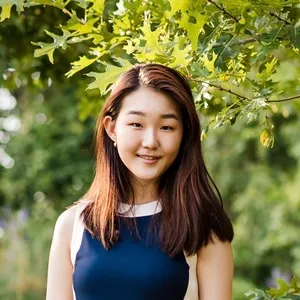Strangely, I think my archive of memories surrounding Chuseok becomes smaller as I grow in age. Spending most of my childhood in Seoul, then moving to North Carolina, and now studying at a college in Maine, it also makes sense that I have trouble remembering exact personal memories I have of the Korean holiday as I physically drift farther and farther away from Korea and my family.
As a major mid-autumn celebration of harvest and abundance, Chuseok is a three-day holiday celebrated on the 15th day of the 8th month according to the lunar calendar. For 2023, Chuseok falls from September 28 to 30. But despite and throughout the changes in my life, Chuseok holds a vivid image in my head and heart of abundance. It is a holiday traditionally celebrated with folk games, dances, and plentiful food.
In my Korean kindergarten, I remember rolling rice flour dough and indenting the middle with our thumbs, creating a pocket for fillings made of honey, sugar, and sesame seeds. These sweet and chewy rice cakes called songpyeon were muted shades of pink, green, yellow, or white, and shaped like a half-moon. Korean ancestors believed full moons could only wane and become smaller, while half moons could wax and grow larger, a sign of prosperity and abundance. To this day, songpyeons are one of the first things that come to my mind when I think of Chuseok.
After moving to the States, I stayed connected to Korean culture and language by attending mass at Korean church and going to a Korean language school on Saturdays. It’s hard to pluck an exact memory surrounding Chuseok. Associating Chuseok with plentiful plates of home-cooked Korean food and a celebration among Korean community members, it almost feels as if everything was Chuseok-tinted all the time because of my easy access to Korean foods and communities. Looking back as a college student now removed from that environment, I realize I took much of this for granted — the home-cooked Korean meals, the joy of conversing in my native language, and even the definition of home that I held.
Writing this piece as a junior-year college student in Maine, I reflect back on Chuseok to think of the Chuseok ahead of us. I recently ran into my friend Daniel, who’s on the leadership team for the Korean Students Association.
“Are you planning to help out with Chuseok?” he asked me.
“I don’t know. Actually, I think so? Do you know what you guys are planning?”
“No idea yet.”
With Chuseok fast approaching, talking to Daniel made me think about the possibilities and the opportunities to celebrate the holiday in new ways while preserving its essence. I ask myself what that could look like, and I’m filled with half-formed thoughts. I think, in a very broad sense, it’s something to do with finding and creating deeper connections within communities. I like to think about food as a powerful means of connection and community-building. Cooking in groups and sharing conversations over food cultivate shared experiences. I believe these moments are especially valuable, as they carry so much joy and gratitude.
For this upcoming Chuseok, I’m feeling hopeful. I hope we can create a fun and vibrant Chuseok, and I hope this Chuseok will bring a welcoming space and opportunity for students missing home to feel connected. I already feel grateful to be sharing my excitement for Chuseok with the Korean Students Association — getting involved with planning activities and events, meeting new faces, and finding new ways to celebrate another year of the holiday away from home.


